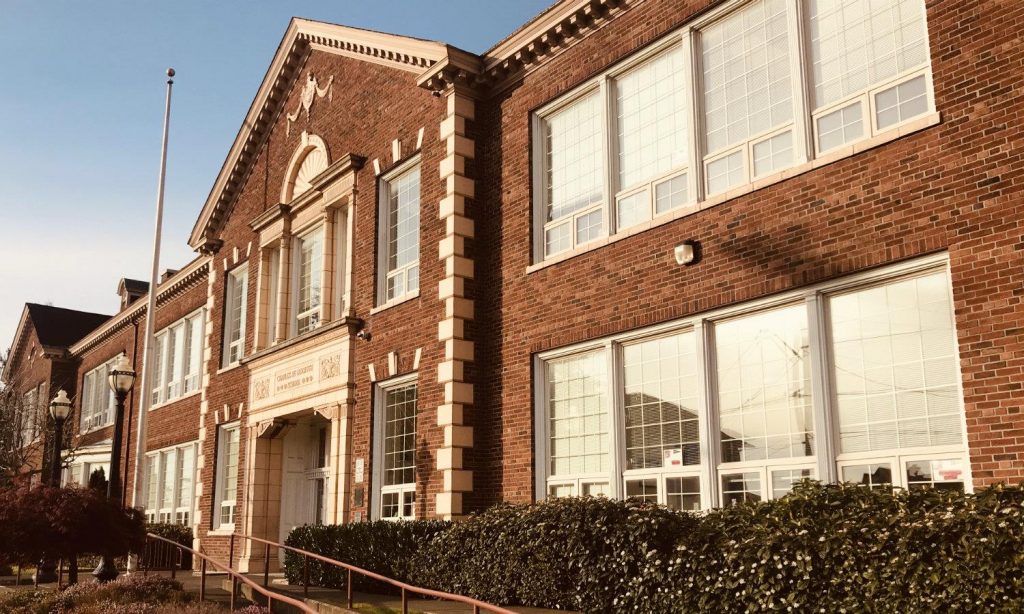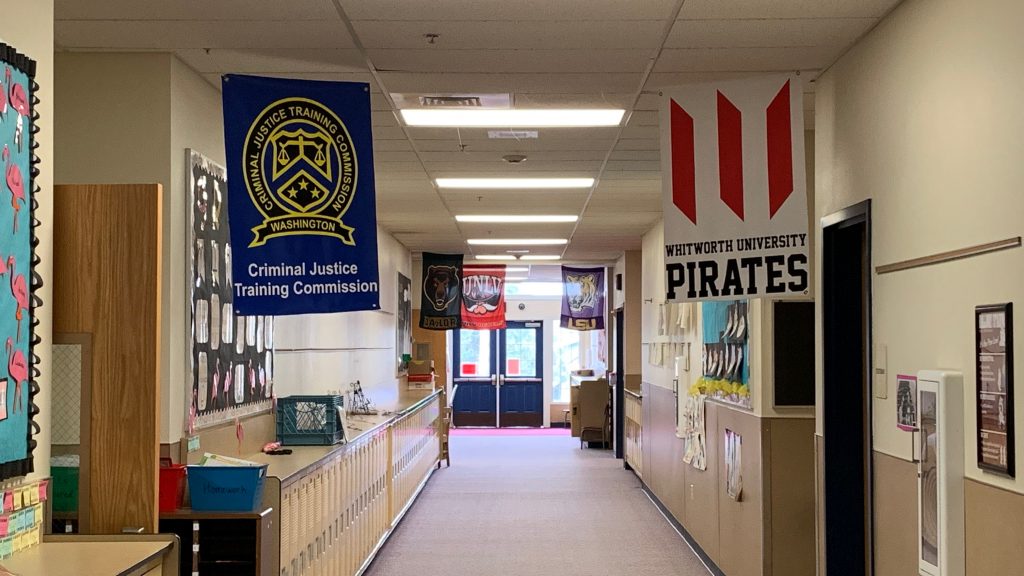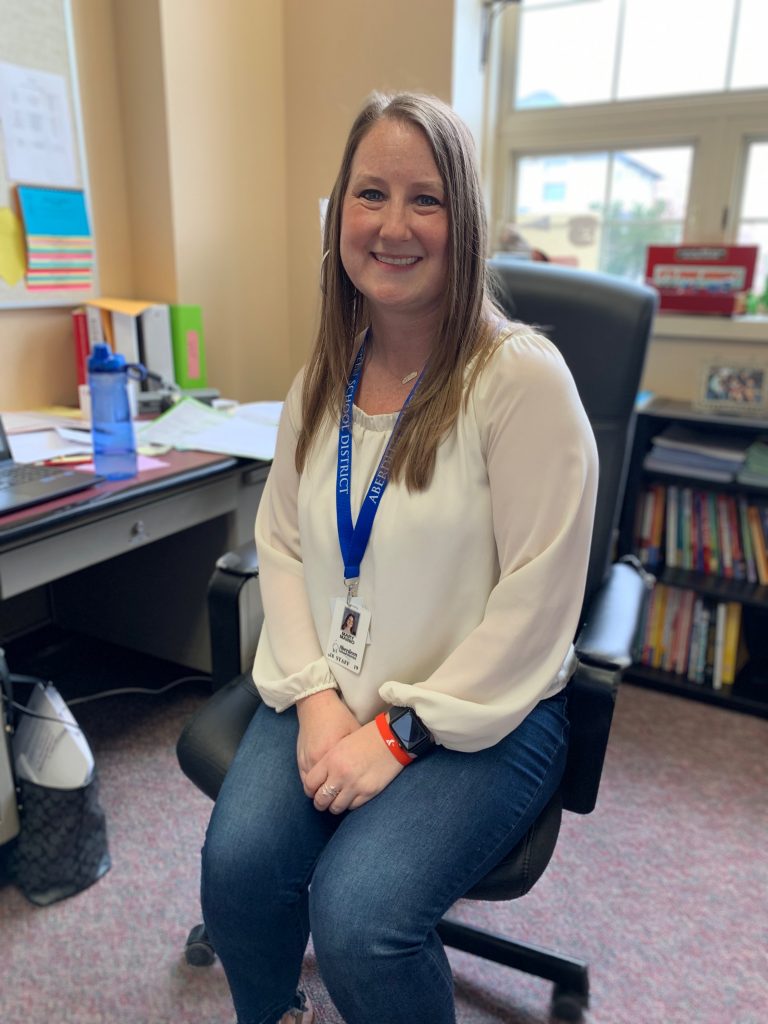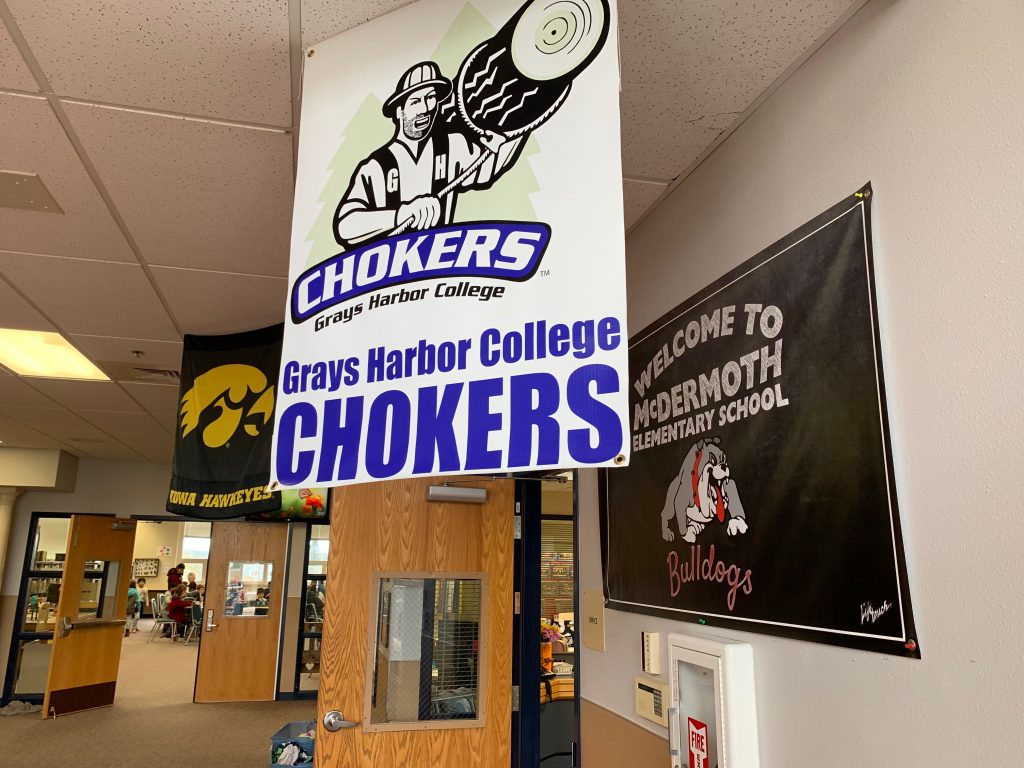
ABERDEEN – In one of McDermoth Elementary’s kindergarten classrooms on a recent Tuesday, students sat in a group on the floor discussing ways to play fairly, such as sharing, taking turns, and trading toys or books.
In a hypothetical example, a boy wished to play with the dinosaur toys that one of his classmates was using.
“How do you think Matthew feels?” asked school counselor Mary Mainio. “He wants to be happy,” one student said. “He feels sad that she might say no,” another added.
After more discussion, Mainio wrapped the lesson with a reminder that including others is important. “We listen to our friends and each other,” she said.
Mainio moved on to a fifth grade classroom for another guidance lesson, and then a third grade classroom. The theme for these lessons was problem solving, and they offered strategies for students to get along with others, behave with integrity, make plans to address problems such as consistently late homework, and more.

At McDermoth, Mainio serves the school’s nearly 400 students from kindergarten to sixth grade. This is her first year at the elementary level, having previously worked for 10 years at the middle and high school levels. Her days include giving guidance lessons, leading small group work with students who need extra social and emotional support, meeting with parents, connecting students and families with community resources, and engaging with students one-on-one around the school.
Mainio sees the role of elementary school counselors as critical in addressing students’ needs when they’re young so they learn foundational skills and can see bright futures for themselves.
Given her work with all age levels of students, Ready WA sat down with Mainio to learn more about daily life as an elementary school counselor, as well as to get her thoughts about the value of career pathway planning. The interview has been lightly edited for clarity and length.

Q: What career exploration activities do you do with elementary school students?
A: Each classroom has a college they learn about for the year. It gets them excited and gives them insight about a college each year.
With younger students, it’s a lot of ‘what do you want to be when you grow up?’ I have coloring sheets – based on what they say, I’ll give them a picture that they can color. With first through fourth grade, I have a PowerPoint game. It gives a description of a job, and they guess the job. For example, ‘I design and build buildings.’ Some of them know what an architect is, but for some of them, it gives them exposure. It’s a fun way to teach them about careers without making it too complicated. With fourth through sixth graders, I do career quest-type activities. They do a simple inventory [similar to what they might do in eighth grade] that tells them what careers they might be interested in.
Q: Why is it important to start career exploration conversations early?
A: It doesn’t happen enough. There are ways to address it in other lessons. A lot of times when I do goal setting with kids, we talk about what they want to do when they grow up. If you don’t have a goal, you don’t know what you want to do or an idea of what that could even look like, that’s kind of defeating for a kid. Even for a second grader who’s struggling in school – let’s set a goal. What do you want to do when you grow up? Oh, well you need math for that. Putting those feelers out for them so that they understand that everything’s connected, and the importance of school now for what they’re going to do when they’re older.
Q: Why is career and pathway planning in schools important?
A: Some students get this information at home, and that is amazing. But the problem is, especially in our community – high poverty – our parents don’t have the resources, and they don’t know this information because maybe they didn’t go to college or graduate high school, so they just don’t know. Making sure that our students have access to more information is important. It’s our job to make sure they understand what they’re capable of and what they have opportunity-wise when they get done.
Q: If middle and high schools could do one thing to implement the High School and Beyond Plan well, what would that be?
A: I would say having an advisory program. I know time is limited, but without advisory programs, kids don’t get the knowledge and the information about what life beyond high school can be. I met individually with every student every year to come up with a plan. I know that’s not realistic everywhere, but it was super important to me. There has to be a system in place that allows that information to get out to kids. They’re all going to be doing something, and it’s up to us to help them figure out what that’s going to be.
Q: What about a best practice for elementary schools?
A: For elementary, it’s making it fun, and finding ways to expose kids to different careers – making that a priority, whether it’s through a career fair, which is only once a year, or showing them different pathways and careers as much as you can. Creating programs that they can relate to. Tying it to the community, to things that they can see a future in.

Q: What’s one thing you love about your job and one of the challenges?
A: The kids and the families! The challenge is time and getting everything done.
Q: What do you hope the community understands about your work as an elementary school counselor?
Kids come into kindergarten without a foundation of social skills. Some kids don’t know where they’re going to stay the next night…or don’t know where they’ll get their next meal. Our kids struggle so much, academics are coming second to a lot of these kids, and you have to be able to address home life and social emotional skills before they’re going to learn. That’s a role that we play. When you wait until junior high to put a counselor in place…if kids aren’t learning those foundational skills in first grade, second grade, they’re not going to care when they get to junior high whether they know how to be nice to somebody. A lot of times their spirit is broken by that point. You have to address those things early, when kids are young.
Many thanks to Mary Mainio and McDermoth Elementary School for having us!
Editor’s note: Blog author Ingrid Stegemoeller is an alum of McDermoth Elementary.